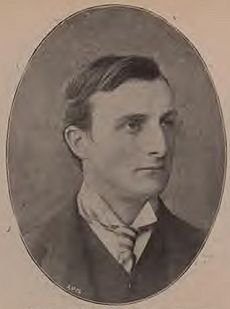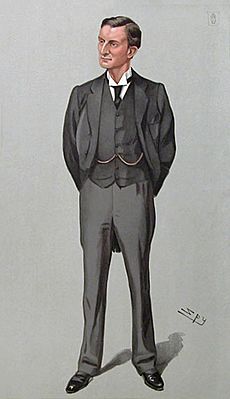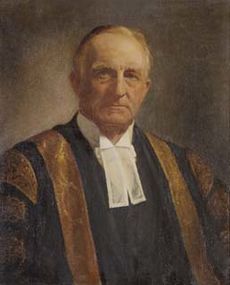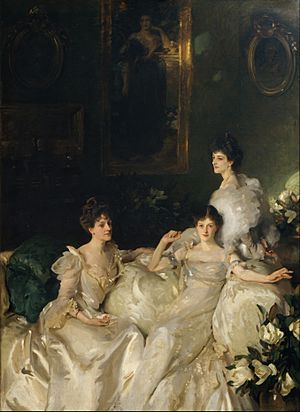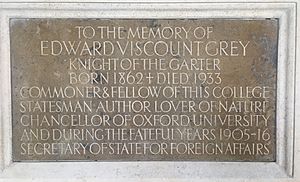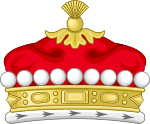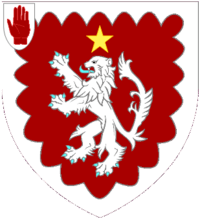Edward Grey, 1st Viscount Grey of Fallodon facts for kids
Quick facts for kids
The Viscount Grey of Fallodon
|
|
|---|---|
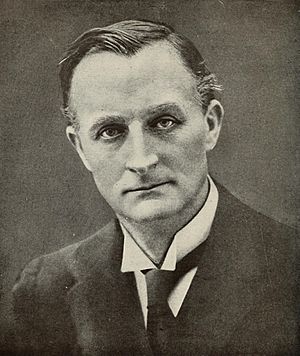 |
|
| British Ambassador to the United States | |
| In office September 1919 – March 1920 |
|
| Nominated by | David Lloyd George |
| Appointed by | George V |
| Preceded by | The Earl of Reading |
| Succeeded by | Sir Auckland Geddes |
| Secretary of State for Foreign Affairs | |
| In office 10 December 1905 – 10 December 1916 |
|
| Prime Minister | Sir Henry Campbell-Bannerman H. H. Asquith |
| Preceded by | The Marquess of Lansdowne |
| Succeeded by | Arthur Balfour |
| Parliamentary Under-Secretary of State for Foreign Affairs | |
| In office 18 August 1892 – 20 June 1895 |
|
| Prime Minister | William Ewart Gladstone The Earl of Rosebery |
| Preceded by | James Lowther |
| Succeeded by | George Curzon |
| Member of the House of Lords Lord Temporal |
|
| In office July 1916 – 7 September 1933 Hereditary Peerage |
|
| Preceded by | Peerage created |
| Succeeded by | Peerage extinct |
| Member of Parliament for Berwick-upon-Tweed |
|
| In office December 1885 – July 1916 |
|
| Preceded by | Hubert Jerningham David Milne Home |
| Succeeded by | Sir Francis Blake |
| Personal details | |
| Born | 25 April 1862 London, England |
| Died | 7 September 1933 (aged 71) Fallodon, England |
| Political party | Liberal |
| Spouses |
Dorothy Widdrington
(m. 1885; died 1906) |
| Relations | House of Grey |
| Alma mater | Balliol College, Oxford |
| Profession | Politician |
Edward Grey, 1st Viscount Grey of Fallodon (born 25 April 1862 – died 7 September 1933), also known as Sir Edward Grey, was an important British politician. He was a member of the Liberal Party and played a key role in shaping Britain's foreign policy before and during World War I.
He served as the Foreign Secretary from 1905 to 1916. This was the longest time anyone had held that job continuously. He helped renew an alliance with Japan in 1911. A main goal of his policy was to protect France from Germany, while trying to avoid a full alliance with France. He supported France during the Moroccan crises in 1905 and 1911. He also helped create the Anglo-Russian agreement in 1907.
His most famous action was during the July Crisis in 1914. He led Britain into World War I against Germany. He believed Britain had to defend France and stop Germany from controlling Western Europe. After the war began, his role in diplomacy became less important. He left his position in December 1916. By 1919, he strongly supported the idea of the League of Nations, an organization for world peace.
He is well-known for his quote on 3 August 1914, as World War I began: "The lamps are going out all over Europe. We shall not see them lit again in our time." In 1916, he was given the title of Viscount. He also served as the Ambassador to the United States from 1919 to 1920.
Contents
Early Life and Education
Edward Grey was born in London, England, on 25 April 1862. He was the oldest of seven children. His grandfather, Sir George Grey, 2nd Baronet, and his great-grandfather, Sir George Grey, 1st Baronet, were also important Liberal politicians. His great-great-uncle was Prime Minister Charles Grey, 2nd Earl Grey, who is famous for the tea named after him.
Edward Grey went to Temple Grove School and then Winchester College. In 1880, he went to Balliol College, Oxford, to study ancient history and philosophy. He wasn't the most hardworking student. He spent a lot of time playing real tennis, and he became the university champion.
In 1882, his grandfather died, and Edward inherited a title (Baronet), a large estate, and money. He tried studying law at Oxford but was sent home for a while. He eventually earned a Third Class degree in law. Later, in 1907, Oxford University gave him an honorary law degree.
After university, Grey wasn't sure what to do. He got a job as an unpaid assistant to Hugh Childers, who was in charge of the country's money. This was his first step into politics.
Grey also became a director of the North Eastern Railway in 1898. He even became its Chairman from 1904 to 1905. He enjoyed this work very much. He continued to be a director for the railway company until 1933.
Early Political Career
In November 1885, Edward Grey was chosen as the Liberal Party candidate for Berwick-upon-Tweed. He won the election and, at 23, became the youngest Member of Parliament (MP) in the House of Commons.
In 1892, he was re-elected and became the Under-Secretary of State for Foreign Affairs. This meant he helped the Foreign Secretary, Lord Rosebery, with international matters. Grey later said he hadn't paid much attention to foreign affairs before this job.
He started to notice that Germany's actions were sometimes "unfriendly." He felt that Britain's policies in the years before 1904 might have accidentally helped Germany.
Statement on French Expansion
In March 1895, Grey made a strong statement in Parliament. He said that if France tried to expand into the Nile Valley, it "would be an unfriendly act." This caused a stir in France and even within the British government. Grey believed his statement might have actually encouraged a French expedition into the area.
The Liberal Party lost a vote in Parliament in June 1895, and Grey left his government job. He was out of office for the next ten years. In 1902, he became a member of the Privy Council, a group of advisors to the King. He was also appointed a deputy lieutenant for Northumberland in 1901.
Foreign Secretary (1905–1916)
In December 1905, the Liberal Party formed a new government. Grey was appointed Foreign Secretary. He was the first Foreign Secretary to be an MP in the House of Commons since 1868. The Liberal Party won a huge victory in the 1906 election. Grey kept his job as Foreign Secretary for 11 years, which is the longest time anyone has held that position.
Agreements with Other Countries
Grey wanted to improve Britain's relationships with other major powers.
- Anglo-Russian Agreement (1907): Grey believed it was important to work with Russia. He wanted Russia to be a strong player in Europe again, alongside France and Britain. This would help keep a balance of power in Europe.
- Agadir Crisis (1911): This was a crisis over Morocco, a country in North Africa. Germany sent a warship to Agadir, which worried Britain and France. Grey worked to calm the situation. He made it clear that Britain would protect its agreements with France and stop Germany from expanding too much in the Mediterranean region.
In 1912, Grey was made a Knight of the Garter, a very high honor. He also visited Germany and invited German officials to talks in Britain.
The July Crisis (1914) and World War I
In 1914, Grey played a central role in the events that led to World War I. There was a big disagreement between Austria-Hungary and Serbia after the assassination of Archduke Franz Ferdinand of Austria. Grey tried to help solve the problem, but both sides mostly ignored his efforts.
On 23 July, Austria-Hungary sent a very strict demand to Serbia. It seemed clear that Serbia could not accept all the demands. Grey tried to arrange a meeting of four major powers (Britain, France, Italy, and Germany) to discuss the issue. However, Germany, France, and Russia were not keen on this idea.
By 28 July, it was clear that war in Europe was likely. On 29 July, the British government put its armed forces on alert. They also agreed to protect Belgium's neutrality, but decided that Britain's response would depend on what was best for the country, not just legal rules.
On 3 August, Germany declared war on France and invaded Belgium. This broke an old treaty that protected Belgium's neutrality. That afternoon, Grey gave an important speech to the House of Commons. As night fell, he famously said, "The lamps are going out all over Europe. We shall not see them lit again in our time."
The British government decided to go to war. They felt they had to help France and protect Belgium. On 4 August, Britain sent an ultimatum to Germany, demanding they leave Belgium. When Germany did not, Britain declared war.
Grey later wrote in his memoirs that the main cause of the war was "militarism and the armaments inseparable from it." He believed that countries building up their armies and making alliances made war unavoidable.
During World War I
After the war began, Grey's role changed. He helped negotiate important secret agreements with new allies like Italy and with France and Russia. These agreements decided how certain territories would be controlled after the war.
In July 1916, Grey was given the title of Viscount Grey of Fallodon. This meant he moved from the House of Commons to the House of Lords. When the government changed in December 1916, Grey left his position as Foreign Secretary.
Later Career
After the war, Grey became President of the League of Nations Union in 1918. This organization promoted the idea of a League of Nations, which was a new international group aimed at preventing future wars.
In 1919, he was appointed Ambassador to the United States. His main job was to encourage the U.S. to join the League of Nations. By this time, Grey's eyesight had become very poor. He served for five months until 1920. He tried to convince the U.S. to approve the Treaty of Versailles, which officially ended World War I, but he was unsuccessful.
Despite his near blindness, Grey remained active in politics. He led the Liberal Party in the House of Lords from 1923 until 1924. In 1928, he was elected Chancellor of the University of Oxford, a position he held until his death in 1933.
Personal Life and Interests
Edward Grey married Dorothy Widdrington in 1885. They shared a love for quiet country life. After Dorothy died in a car accident in 1906, Grey remained single for many years. In 1922, he married Pamela Adelaide Genevieve Wyndham. He did not have any children from either marriage.
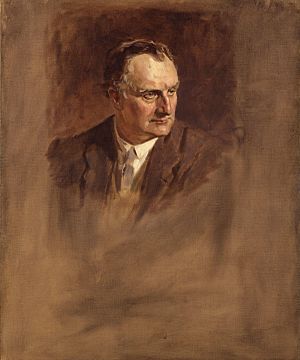
Grey was a talented athlete. He played football for his college and was an excellent tennis player. He won the British tennis championship several times.
He was also a lifelong fly fisherman. He even wrote a popular book about it called Fly Fishing in 1899. Even when his eyesight got bad, he continued to fish by touch.
Grey was also very interested in ornithology, the study of birds. One famous photo shows a robin perched on his hat. He wrote a book called The Charm of Birds in 1927. In 1933, he helped start the British Trust for Ornithology (BTO), an organization for studying birds in Britain.
Death
Lady Grey of Fallodon died in 1928. Lord Grey of Fallodon died on 7 September 1933, at the age of 71. He was cremated, and his ashes were buried with his first wife, Dorothy, on his estate. A simple stone marks their resting place, saying: "Here, among trees that they planted together, are placed the ashes of Edward and Dorothy Grey."
Because he had no children, his title of Viscount ended when he died. However, his cousin, Sir Charles George Grey, 4th Baronet, inherited his baronetcy. Edward Grey is remembered in several places, including at Winchester College and by a plaque at the Foreign Office in London. The Edward Grey Institute of Field Ornithology at Oxford University is also named after him.
Works
- Fly Fishing (1899)
- Recreation (1920)
- Twenty-Five Years, 1892-1916. (1925)
- Fallodon Papers (1926)
- The Charm of Birds (1927)
Honours
British Empire Honours
| Country | Date | Appointment | Post-nominal letters |
|---|---|---|---|
| 11 August 1902–7 September 1933 | Member of His Majesty's Most Honourable Privy Council | PC | |
| 12 February 1912–7 September 1933 | Knight of the Order of the Garter | KG | |
| Deputy Lieutenant of the County of Northumberland | DL |
Arms
|
Scholastic
- Chancellor, visitor, governor, rector and fellowships
| Location | Date | School | Position |
|---|---|---|---|
| 1928 – 7 September 1933 | University of Oxford | Chancellor |
Memberships and Fellowships
| Country | Date | Organisation | Position |
|---|---|---|---|
| 26 November 1914 – 7 September 1933 | Royal Society | Fellow (FRS) - Elected under Statute 12 | |
| – 7 September 1933 | Zoological Society of London | Fellow (FZS) |
Images for kids
See also
 In Spanish: Edward Grey para niños
In Spanish: Edward Grey para niños
- British entry into World War I
- Liberal government, 1905–1915
- Timeline of British diplomatic history#1897-1919
- Edward Grey Institute of Field Ornithology
 | Laphonza Butler |
 | Daisy Bates |
 | Elizabeth Piper Ensley |


